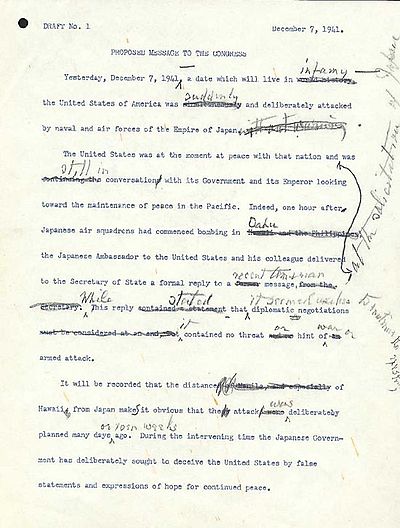DECEMBER 7, 2019 – As President Franklin D. Roosevelt said famously in his address before a joint session of Congress, December 7, 1941 is “a date which will live in infamy.” He certainly welcomed the opening of the “door war” that had been closed so long and firmly by isolationists. Japan’s attack served as a clear-cut justification for our entry into World War II. That conflict had begun more than two years before with the German Blitzkrieg against Poland. In Asia and the Pacific, Japan had invaded Manchuria a full eight years before that.
When Hitler unleashed his offensive against Britain in July 1940, Churchill leaned heavily on Roosevelt. The two leaders became close, and the American president did all he could to assist, but isolationist sentiments in the U.S. precluded full American intervention.
Pearl Harbor changed all that. On December 8, 1941, Congress approved a resolution declaring war against Japan. In the Senate, the vote was 82 to 0. The House vote was 388 to 1. How quickly the country’s predominant sentiment had shifted from isolationist to interventionist. The sole holdout had been Jeannette Rankin, a Republican from Montana. Up to 7:53 a.m. local time (12:53 p.m., Eastern Standard Time), her view had been mainstream. Twenty-four hours later, she was a pariah for adhering to that view.
(After the vote she explained, “As a woman, I can’t go to war, and I refuse to send anyone else. She would later become a tour de force in the anti-war movement during the Vietnam War era. Irrespective of your politics, you have to respect Rankin for her immense political courage.)
The near unanimous vote in Congress lifted a great weight from FDR’s shoulders. Remember, though, that Churchill had been pleading for support against Germany, and the resolution before Congress on December 8, 1941 was for declaration of war against Japan. If the back door of isolationism was now open, Roosevelt wanted Hitler to kick in the front door. Under his pact with the Japanese, that’s exactly what Hitler did. Waiting for this move was politically astute on FDR’s part: with the Nazi dictator acting as aggressor on the Atlantic side, Roosevelt had no problem transforming Americans into full-scale interventionists in support of Britain, occupied France and others.
It’s futile to “what-if” about history—in the case of Pearl Harbor, what if we had not declared war on Japan and Hitler had consequently not declared war against the U.S.? Would the Axis Powers have conquered most of the world? For how long? At what cost greater than the losses caused by nearly four more years of war? Only a super-computer yet to be devised could answer.
What’s certain is that the attack on Pearl Harbor triggered a radical change in American political dynamics—and consequently in the course of world events now history. Roosevelt had his green light, and he stomped on the gas pedal. Hitler’s reaction removed the brakes.
Welcome to planet earth, where one thing always leads to another.
(Remember to subscribe to this blog and receive notifications of new posts by email.)
© 2019 Eric Nilsson
